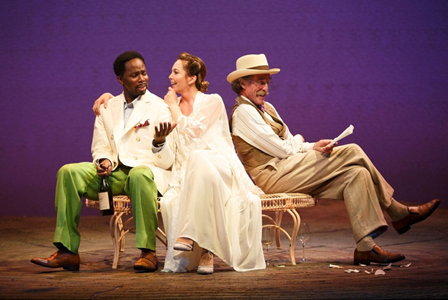The Cherry Orchard
by Elizabeth Ahlfors

Harold Perrineau, Diane Lane and John Glover.
Photo by Joan Marcus
The Roundabout Theater's new revival of Anton Chekhov's tragicomedy, The Cherry Orchard at the American Airlines Theatre, with a cast starring Diane Lane, Harold Perrineau and Joel Grey, aims to stress the relevance and difficulties of a changing world. That makes sense. The problems of economic and class inequality certainly bears relevance today. However, adapted by Stephen Karam (The Humans) and directed by Britain's Simon Godwin, this play shows disjoined clumsiness shuffling around in a world trying to be both contemporary and classic.
At one point, Madame Ranevskaya, played by Lane, comments, “I don’t know what to make of it. I’m losing my bearings.”
The self-centered Ranevskaya, has just returned from a life in Paris to her Russian family estate. Years ago, she left her home and daughters, the grim (Tavi Gevinson) and drab stepdaughter Varya (Celia Keenan-Bolger), to live with her lover. Now, after he abandons her, Ranevskaya returns to protect her dwindling legacy. The estate is deep in debt and about to be auctioned off by an upstart businessman, Lopakhin (Harold Perrineau), who plans to buy the land and demolish the cherry orchard, selling off parcels as vacation homes. There is not much that Ranevskaya or her brother, Gaev (John Glover) can do. Stopping Lopakhin means halting the slippery slope of a declining way of life.
Lane, frivolous and commanding, portrays a lovely Russian aristocrat who shows her character as too self-involved to connect with anyone except her brother. Lane exudes the confidence of European aristocracy, contrasting with the modern attitudes of her daughters and the brash authoritative businessman, Lopakhin. An African-American, Perrineau's energetic Lopakhin who has advanced from serfdom (called "slave" here) to successful entrepreneur. John Glover is entertaining as Ranevskaya's supportive brother but we do not see much insight from Chuck Cooper as another landowner or Kyle Beltran, the starving student, Trofimov. As they reminisce and romanticize about the past and argue about changes, it becomes obvious that hours are slipping by and everyone has to leave the past.
The Cherry Orchard, first staged in 1904, was Chekhov's last play. Trying to insert a contemporary/historic feeling, Karam's adaption never finds its place. A high point in the production is the colorful costume ball in Act III, with a live quartet, dancing and a touch of mystery. Yet the romance and elegance of that moment in history passes. The cast is racially mixed but this does not explain the numerous characters, darting in and out, who do not coalesce between themselves or connect with the audience. Contemporary dress by Michael Krass mixes with traditional, for no apparent reason. Scott Pask's staging is bare, with some kindergarten-sized tables and chairs. Reminiscent of the children's youth? As for a cherry orchard, we are told it is out there someplace but except for some Calder-type mobiles, there is no evidence of trees.
Most affecting is Firs, the symbol of old Russia, who longs for the way things used to be. Played lovingly by Joel Grey, Firs is the devoted family servant of a family who takes him for granted. He is the last to leave the estate, the others having scurried away, forgetting him. This ending is the most emotional moment of the production and similarly this barren cherry orchard lacks the luscious nutrition that Chekhov intended.
This review also appears in TotalTheater.com
The Cherry Orchard
Roundabout Theatre Company
American Airlines Theatre
227 - West 42th Street, NY
Previewed: Sept 20, 2016. Opening: Oct. 16, 2016 Closing: Dec. 4, 2016
Written by: Anton Chekhov, adapted by Stephen Karam
Directed by: Simon Godwin
Running time: 2 hours. 15 minutes. One intermission
Review by Elizabeth Ahlfors